Xinnong Zhang
SocioVerse: A World Model for Social Simulation Powered by LLM Agents and A Pool of 10 Million Real-World Users
Apr 14, 2025



Abstract:Social simulation is transforming traditional social science research by modeling human behavior through interactions between virtual individuals and their environments. With recent advances in large language models (LLMs), this approach has shown growing potential in capturing individual differences and predicting group behaviors. However, existing methods face alignment challenges related to the environment, target users, interaction mechanisms, and behavioral patterns. To this end, we introduce SocioVerse, an LLM-agent-driven world model for social simulation. Our framework features four powerful alignment components and a user pool of 10 million real individuals. To validate its effectiveness, we conducted large-scale simulation experiments across three distinct domains: politics, news, and economics. Results demonstrate that SocioVerse can reflect large-scale population dynamics while ensuring diversity, credibility, and representativeness through standardized procedures and minimal manual adjustments.
From Individual to Society: A Survey on Social Simulation Driven by Large Language Model-based Agents
Dec 04, 2024



Abstract:Traditional sociological research often relies on human participation, which, though effective, is expensive, challenging to scale, and with ethical concerns. Recent advancements in large language models (LLMs) highlight their potential to simulate human behavior, enabling the replication of individual responses and facilitating studies on many interdisciplinary studies. In this paper, we conduct a comprehensive survey of this field, illustrating the recent progress in simulation driven by LLM-empowered agents. We categorize the simulations into three types: (1) Individual Simulation, which mimics specific individuals or demographic groups; (2) Scenario Simulation, where multiple agents collaborate to achieve goals within specific contexts; and (3) Society Simulation, which models interactions within agent societies to reflect the complexity and variety of real-world dynamics. These simulations follow a progression, ranging from detailed individual modeling to large-scale societal phenomena. We provide a detailed discussion of each simulation type, including the architecture or key components of the simulation, the classification of objectives or scenarios and the evaluation method. Afterward, we summarize commonly used datasets and benchmarks. Finally, we discuss the trends across these three types of simulation. A repository for the related sources is at {\url{https://github.com/FudanDISC/SocialAgent}}.
ElectionSim: Massive Population Election Simulation Powered by Large Language Model Driven Agents
Oct 28, 2024



Abstract:The massive population election simulation aims to model the preferences of specific groups in particular election scenarios. It has garnered significant attention for its potential to forecast real-world social trends. Traditional agent-based modeling (ABM) methods are constrained by their ability to incorporate complex individual background information and provide interactive prediction results. In this paper, we introduce ElectionSim, an innovative election simulation framework based on large language models, designed to support accurate voter simulations and customized distributions, together with an interactive platform to dialogue with simulated voters. We present a million-level voter pool sampled from social media platforms to support accurate individual simulation. We also introduce PPE, a poll-based presidential election benchmark to assess the performance of our framework under the U.S. presidential election scenario. Through extensive experiments and analyses, we demonstrate the effectiveness and robustness of our framework in U.S. presidential election simulations.
AgentSense: Benchmarking Social Intelligence of Language Agents through Interactive Scenarios
Oct 25, 2024



Abstract:Large language models (LLMs) are increasingly leveraged to empower autonomous agents to simulate human beings in various fields of behavioral research. However, evaluating their capacity to navigate complex social interactions remains a challenge. Previous studies face limitations due to insufficient scenario diversity, complexity, and a single-perspective focus. To this end, we introduce AgentSense: Benchmarking Social Intelligence of Language Agents through Interactive Scenarios. Drawing on Dramaturgical Theory, AgentSense employs a bottom-up approach to create 1,225 diverse social scenarios constructed from extensive scripts. We evaluate LLM-driven agents through multi-turn interactions, emphasizing both goal completion and implicit reasoning. We analyze goals using ERG theory and conduct comprehensive experiments. Our findings highlight that LLMs struggle with goals in complex social scenarios, especially high-level growth needs, and even GPT-4o requires improvement in private information reasoning.
AI-Press: A Multi-Agent News Generating and Feedback Simulation System Powered by Large Language Models
Oct 10, 2024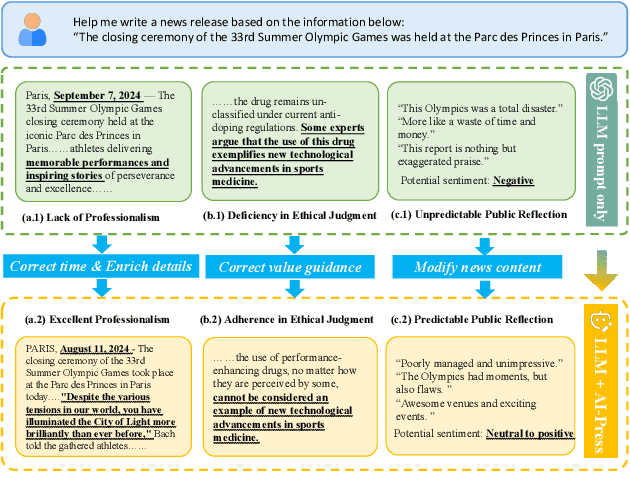
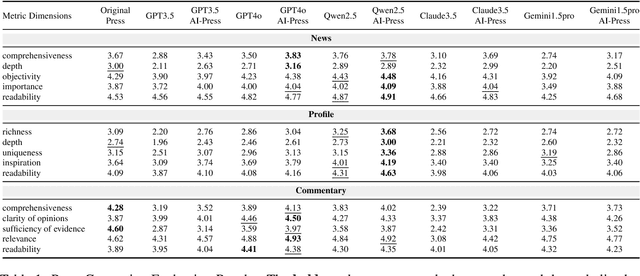
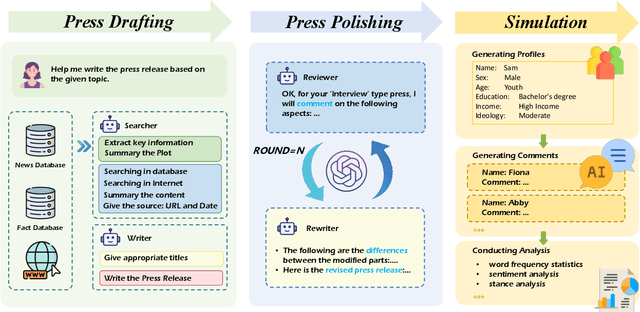
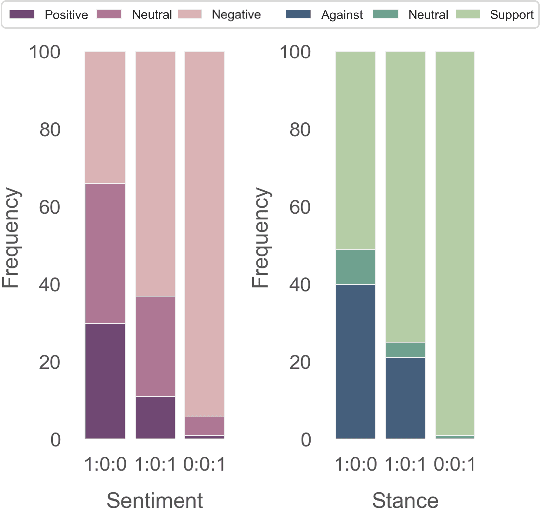
Abstract:The rise of various social platforms has transformed journalism. The growing demand for news content has led to the increased use of large language models (LLMs) in news production due to their speed and cost-effectiveness. However, LLMs still encounter limitations in professionalism and ethical judgment in news generation. Additionally, predicting public feedback is usually difficult before news is released. To tackle these challenges, we introduce AI-Press, an automated news drafting and polishing system based on multi-agent collaboration and Retrieval-Augmented Generation. We develop a feedback simulation system that generates public feedback considering demographic distributions. Through extensive quantitative and qualitative evaluations, our system shows significant improvements in news-generating capabilities and verifies the effectiveness of public feedback simulation.
SoMeLVLM: A Large Vision Language Model for Social Media Processing
Feb 20, 2024

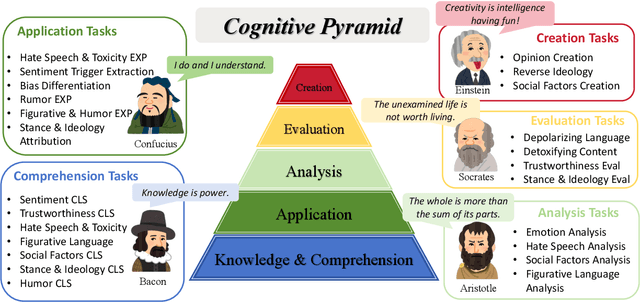

Abstract:The growth of social media, characterized by its multimodal nature, has led to the emergence of diverse phenomena and challenges, which calls for an effective approach to uniformly solve automated tasks. The powerful Large Vision Language Models make it possible to handle a variety of tasks simultaneously, but even with carefully designed prompting methods, the general domain models often fall short in aligning with the unique speaking style and context of social media tasks. In this paper, we introduce a Large Vision Language Model for Social Media Processing (SoMeLVLM), which is a cognitive framework equipped with five key capabilities including knowledge & comprehension, application, analysis, evaluation, and creation. SoMeLVLM is designed to understand and generate realistic social media behavior. We have developed a 654k multimodal social media instruction-tuning dataset to support our cognitive framework and fine-tune our model. Our experiments demonstrate that SoMeLVLM achieves state-of-the-art performance in multiple social media tasks. Further analysis shows its significant advantages over baselines in terms of cognitive abilities.
 Add to Chrome
Add to Chrome Add to Firefox
Add to Firefox Add to Edge
Add to Edge